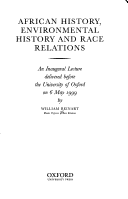Inaugural Lecture
1 total work
African History, Environmental History and Race Relations
by William Beinart
Published February 2000
In his inaugural lecture, Professor Beinart observes that, to those who established the Rhodes Chair of Race Relations, and to subsequent electors, "race relations" has meant "the impact of European civilizations on non-European peoples and territories" in Africa. The exciting field of African environmental history, powered by an anxious modern environmentalism, emphasizes the destructive impact of Western expansion on African environments. In doing so, it has drawn upon a powerful anti-colonial strand in African studies. Authoritarian patterns of colonial environmental regulation have been subjected to a retrospective critique, while the salience of local African environmental knowledge has been celebrated. Professor Beinart examines this literature critically. He argues that, historically, African societies were able to establish a certain command over nature, and that we should recognize the shared human capacity to wield power for ill as well as for good, over nature as well as over people. Local knowledge has great strengths but also important limitations; we need a more thorough and sympathetic assessment of natural sciences in Africa.
